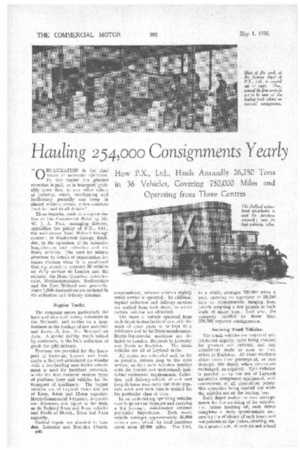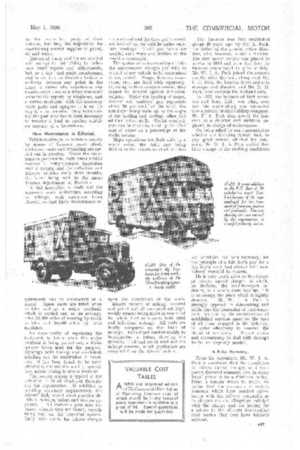Hauling 254,000 Consignments Yearly
Page 104

Page 105

If you've noticed an error in this article please click here to report it so we can fix it.
How P.X., Ltd., Hauls Annually 26,250 Tons in 36 Vehicles, Covering 750,000 Miles and Operating from Three Centres
"0 RGANIZATION is the chief factor of successful operation. To this matter the greatest attention is paid, as in transport, probably more than in any other sphere of industry, waste, overlapping and inefficiency generally can creep in almost without notice, unless constant
heed be paid to all details." ,
These remarks, made to a representative of The Commercial Motor by Mr. W, J. A. Peck, managing. director, crystallize the policy of P.X., Ltd., the well-known East Midland haulage concern, of Washbrook Garage, Rushden, in the operation of its extensive long-distance and collection and delivery services. The need for minute attention to details of organization becomes obvious when it is mentioned that tlp company operates 36 vehicles on daily services to London and the suburbs, the Home Counties, Leicestershire, Northamptonshire, Bedfordshire and the East Midland area generally. Some 1,600 destinations are included in the collection and delivery schedule.
Regular Traffic.
The company serves particularly the boot and shoe and hosiery industries in the Midlands, and carries on a large business in the haulage of raw materials and foodstuffs from the Metropolitan Area. A special facility, much valued by customers, is the bulk collection of goods for split delivery.
Boxvans are provided for the transport of footwear, hosiery and foodstuffs, a Bedford articulated six-wheeler with a low-loading semi-trailer attachment is used for furniture removals, whilst the fleet includes various types of platform lorry and vehicles for the transport of machinery. The largest vehicles are of Leyland make and are of 5-ton, 6-ton and 12-ton capacity. Morris-Commercial 1-tonners, 2-tonners and 3-tonners also figure in the fleet, as do Bedford 2-ton and 3-ton vehicles and Fords of 30-cwt., 2-ton and 3-ton capacity.
Central depots are situated in London, Leicester and Rushden (North amptonshire), between which a nightly trunk service is operated. In addition, regular collection and delivery services are worked from each depot, to which certain vehicles are allocated.
The make of vehicle operated from each depot is standardized to enable the stock of spare parts to be kept to a minimum and to facilitate maintenance. Morris-Commercial machines are detailed to London, Bedfords to Leicester and Fords to Rushden. The trunk vehicles are all of Leyland make.
All routes are scheduled and, so far as possible, drivers keep to the same service, so that each becomes familiar with the district and understands individual customers' requirements. Collection and delivery-vehicle drivers and long-distance men carry out their separate work and each man is trained for his particular class of duty.
In an undertaking operating vehicles over large annual mileages and carrying a big tonnage, maintenance assumes particular importance. Each trunk vehicle averages approximately 35,000 miles a year, whilst the local machines cover some 16,000 miles. The fleet, as a whole, averages 750,000 miles a year, carrying an aggregate of 26,250 tons in consignments ranging from parcels weighing a few pounds to bulk loads of many tons. Last year, the company handled no fewer than 254,392 separate consignments.
Servicing Trunk Vehicles.
The trunk vehicles are inspected and lubricated nightly, tyres being checked for pressure and inflated, and any adjustment made so soon as they arrive at Rushden. All these machines either finish their journeys at, or pass through, this depot, where drivers are exchanged, as required. Tyre inflation is speeded up by the use of Laycock automatic compressor equipment, with connections at all convenient points, this operation being carried out while the vehicles are at the loading bay.
Each depot makes its own arrangements for the servicing of its vehicles, but, before booking off, each driver completes a daily questionnaire concerning the efficiency of such important components as the brakes, steering, etc. As a general rule, drivers do not attend to the mechanical parts of their vehicles, but they are responsible' for maintaining correct supplies of petrol, oil and water.
-Drivers of trunk vehieles are selected with an eye to their ability to undertake small te:pairs and 'adjustments, but, as a day and night maintenance staff is on duty at liusliden (which is mid-way between any point in the area), a driver who •.experiences any trouble other than of a minor character immediately reports by telephone, and a Service meehanic,' with the necessary spare parts ' arid ecpitipment is on his way in a few minutes. Only twice during the past year has it been necessary to transfer a lOad to another vehiele on account of a breakdown.
How Maintenance is Effected. Vehicle washing is undertaken weekly by means of Layoock power plant, whilseoverhauls and repainting are Carried out in rotation. Under the maintenance programme, each trunk vehicle receives a comprehensive inspection once a month, 'and the collection and delivery vehicles every three months, the latter being sent to the maintenance department at Rushden. A full inspection is made and the necessary work undertaken according to mileage,each operation being charted, so that likely maintenance re quirements can be ascertained at a glance. Spare units are fitted when vehicles undergo a major overhaul, which is carried out, on an average, after 60,000 miles of running by trunk vehicles and 30,000 miles by local machines.
An opportunity of repainting the bodywork is taken while the major overhaul is being carried out, a Binks sprayer being used for the purpose. Although both honing and crankshaft grinding can be undertaken if necessary, it has been •found to be more efficient to entrust this work to specialists, unless honing in situ is desirable.
The costing system is typical of the attention to detail displayed throughout the organization. In addition to fulfilling statutory requirements, the drivers' daily report sheet provides details of mileage, orders and various ex penses. All materials pass into the stores, whence they are issued, records being kept on the loose-leaf system. Daily time sheets for labour charges
are analysed and the time and material are booked'. to the" Vehicle•'inider: sepa• rate headings. -Theai particulars are totalled each week and debited to the machine concerned.
The system of costs recording enables the maintenance charges per mile in' respect of any Vehicle tO he ascertained at any period. Vv'ages, licences. insurances, etc., are dealt with Separately, as, owing to their complex nature, they Cannot be debited against individual vehicles. •Under the heading of wages, drivers' and vanladys' pay' represents about 70 per cent.' of the total, the remainder being made up by the wages of the loading and sorting, officeand administrative. staffs.Useful comparisons can be made by treating the Vital cost of wages as a percentage of the traffic returns.
Major operations, are dealt with by a• works order, the total cost being debited to the vehicle to which it refers upon the completion of the work.
Minute records of mileage covered and petrol and oil consumed are kept, weekly returns being made in respect of the whole fleet as regards both total and individual mileage. All costs are finally computed on the basis of mileage. Each depot renders weekly to headquarters a return showing the quantity of oil and petrol used and the mileage covered, which particulars are compiled from the drivers' orders. The business was first established about 40years ago bY Mr: A. Peck, -the fatherof the present active directors,who, however, is still a director. The first motor vehicle was placed in service in 1916 and from that date the business commenced to grow rapidly. Mr. W. J. A, Peck joined the e.oncovn shortly after the' war, along with Mr. G.C.Peck, the _London depot and area manager and director, and Mr. E. D. Peck; who controls the Midland area.
In 1934, the business of Bert Scroxton and Sons, Ltd., was taken over and the undertaking was converted into'a private limited-liability company, Mr. F. A. Peck then joined the Concern_ as .a director, and assistant engineer, in charge of maintenance.
On being asked by our representative whether -the licensing 'system had, to any great extent: affected his company, Mr. W: J. A. peck replied that little change in the working conditions
and schedules had been necessary, for the principle of a fair day's pay for a fair day's work had always been considered essential to success.
He is very much alive to the danger of railway agreed charges, to which, he declares, the road-transport industry, as a whole, must face up, if it is to occupy the place which it rightly
deserves. Mr. W. J. A. Peck is strongly opposed to rate-cutting and holds that the increasing of road-transport facilities by the co-ordination of established services mast be the task of all those engaged in the industry,
in order effectively counter the threat of monopoly. Expert rating and accountancy to deal with through traffic, are urgently needed.
A False Economy.
From his experience, Mr. W. J. A. Peck is convinced that the acceptance of railway agreed charges, as a temporary financial economy, can, in many ways, prove to be a mistaken policy. From a remark which he made, we gather that the customers of certain concerns which have reached agreements with the railway coMpanies as to charges are not altogether satisked with the change and are hoping for a return to the efficient door-to-door road service that they have hitherto enjoyed.








































































































































































